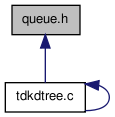queue.h File Reference
A First In-First Out (FIFO) data structure: header file. More...
#include "tdkdtree.h"

Go to the source code of this file.
Data Structures | |
| struct | qnode |
Node definition. The variable info is a pointer to the information contained in the node and next is a pointer to the next element in the queue. More... | |
| struct | queue |
Queue definition. A queue is a standard queue that has infokdnode data structures as elements. The variable first is a pointer to the first element and last is a pointer to the last element in the queue. More... | |
Typedefs | |
| typedef struct qnode | qnode |
Node definition. The variable info is a pointer to the information contained in the node and next is a pointer to the next element in the queue. | |
| typedef struct queue | queue |
Queue definition. A queue is a standard queue that has infokdnode data structures as elements. The variable first is a pointer to the first element and last is a pointer to the last element in the queue. | |
Functions | |
| void | qbuild () |
| Building an empty queue. | |
| void | qinsert () |
| qnode * | qretrieve () |
| Retrieving a pointer to the first element from the queue. | |
| void | qdelete () |
| Deleting the first element from the queue. | |
| int | qempty () |
| Checking if the queue is empty. | |
| void | qdestroy () |
| Destroying a queue object. | |
Detailed Description
A First In-First Out (FIFO) data structure: header file.
- Version:
- 10.10
- Date:
- October 19th, 2010
A straightforward implementation of a queue data structure for FIFO storing-strategy based on a description of J. Villalobos (1996).
- Note:
- Last change was in October 19th, 2010.
Definition in file queue.h.
Typedef Documentation
Node definition. The variable info is a pointer to the information contained in the node and next is a pointer to the next element in the queue.
Queue definition. A queue is a standard queue that has infokdnode data structures as elements. The variable first is a pointer to the first element and last is a pointer to the last element in the queue.
Function Documentation
| void qbuild | ( | void | ) |
| void qdelete | ( | void | ) |
| void qdestroy | ( | void | ) |
| int qempty | ( | void | ) |
| void qinsert | ( | ) |
- See also:
- qinsert
| qnode* qretrieve | ( | void | ) |
Retrieving a pointer to the first element from the queue.
- See also:
- qretrieve
The element pointed by first is retrieved by the function that done the calling. The element is not deleted from the queue.
- Returns:
- A pointer to the first element.
Definition at line 81 of file queue.c.




 1.6.3
1.6.3